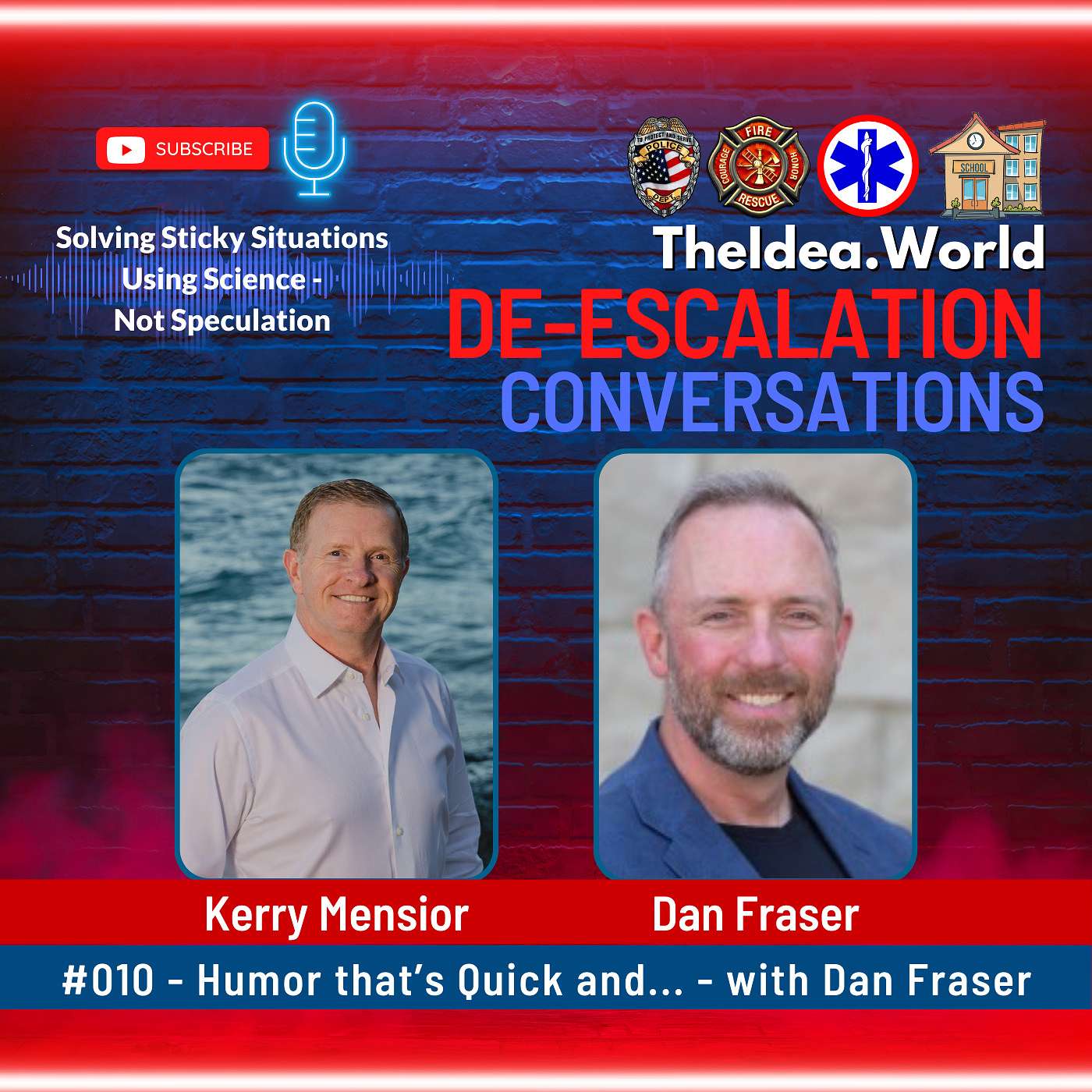

010 - Humor that’s Quick and Messages that Stick - with Dan Fraser
De-Escalation Conversations
| Sgt. Kerry Mensior (Ret.) | Rating 0 (0) (0) |
| https://TheIdea.World | Launched: May 16, 2023 |
| Team@TheIdea.world | Season: 1 Episode: 10 |
VIDEO VERSION:
https://lynxshort.com/dec_010
On this episode of De-Escalation Conversations, Kerry Mensior discusses the trend of De-Escalation in North American Law Enforcement with guest Dan Fraser. They stress the importance of teaching a framework for De-Escalation to use in many situations, rather than just “Time, Distance, Shielding”. They also address the resistance experienced officers often have when it comes to De-Escalation training.
In this episode, you'll also learn about transferable communication skills for dealing with highly emotional situations and emphasizes the benefits of emotional labeling, breaking down IDEA’s Communication Success Formulas, (Relationship Math), and also how to use Brain-centric Design (BcD), training methods so trainees can quickly master new content. Fear is explored as the root of all conflict, with a real-life example of using De-Escalation tactics in family conflicts related to a law enforcement officer's work schedule. Overall, the episode aims to improve law enforcement training, as well as communication skills in other professions.
GUEST BIO:
Dan Fraser is a speaker, author and a retired Police Sergeant from Alberta, Canada. Much of his career was focused on making officers better through effective patrol tactics and communications training. He has specialty training in use of force analysis and investigations, crisis negotiations, reality-based training and sports hypnosis. He continues to train officers in communication skills and human factors in use of force. He has a passion for helping instructors hone their ability to deliver unforgettable training. He is the author of the book “Kickass Presentations – Wow Audiences with PowerPoint Slides that Click, Humor that’s Quick and Messages that Stick.”
Topics covered on De-Escalation and Brain-centric Design Training Techniques:
- Deescalation in North American law enforcement
- Resistance from experienced officers to deescalation training
- Good training should focus on retention and transfer
- Deescalation often associated with crisis negotiation, not tactical skill
- Heart-centered approach to improving law enforcement training
- Ego and poor training as root causes of officer misconduct in videos
- Transferable skills for dealing with emotionally charged situations
- Importance of deescalation in various professions and situations
- Law enforcement's responsibility to avoid force when possible
- Critique of bolt-on deescalation training methods
- Cognitive overload and strategies for effective teaching
- Visuals and memory joggers
- Getting students out of Survival State and into Executive State
- Emotional labeling as a skill for effective communication
- Regular practice to improve muscle memory
- Life skills that benefit various professions
- Importance of interpersonal communication and being respectful and kind
- Clarity and consistency needed in deescalation training across No
IDEA - the International De-Escalation Association, is dedicated to Saving Lives, Reputations, & Relationships through Conflict De-Escalation & Communication Training for Teachers, Parents, and Public Safety Providers.
Find more about
How to Calm an Angry Person in 90 Seconds or Less
Come visit us at the IDEA website (International De-Escalation Association):
https://TheIdea.World
Subscribe to our free weekly newsletter to stay up to date on the latest news and blogs about Schools, Police, Fire, Medical Services and Flight Attendants.
Do you or your organization need Communication Skills and De-Escalation Training? You can reach us directly at: Team@TheIdea.World or by filling out a contact form at https://www.TheIdea.World/contact
SUBSCRIBE
Episode Chapters

VIDEO VERSION:
https://lynxshort.com/dec_010
On this episode of De-Escalation Conversations, Kerry Mensior discusses the trend of De-Escalation in North American Law Enforcement with guest Dan Fraser. They stress the importance of teaching a framework for De-Escalation to use in many situations, rather than just “Time, Distance, Shielding”. They also address the resistance experienced officers often have when it comes to De-Escalation training.
In this episode, you'll also learn about transferable communication skills for dealing with highly emotional situations and emphasizes the benefits of emotional labeling, breaking down IDEA’s Communication Success Formulas, (Relationship Math), and also how to use Brain-centric Design (BcD), training methods so trainees can quickly master new content. Fear is explored as the root of all conflict, with a real-life example of using De-Escalation tactics in family conflicts related to a law enforcement officer's work schedule. Overall, the episode aims to improve law enforcement training, as well as communication skills in other professions.
GUEST BIO:
Dan Fraser is a speaker, author and a retired Police Sergeant from Alberta, Canada. Much of his career was focused on making officers better through effective patrol tactics and communications training. He has specialty training in use of force analysis and investigations, crisis negotiations, reality-based training and sports hypnosis. He continues to train officers in communication skills and human factors in use of force. He has a passion for helping instructors hone their ability to deliver unforgettable training. He is the author of the book “Kickass Presentations – Wow Audiences with PowerPoint Slides that Click, Humor that’s Quick and Messages that Stick.”
Topics covered on De-Escalation and Brain-centric Design Training Techniques:
- Deescalation in North American law enforcement
- Resistance from experienced officers to deescalation training
- Good training should focus on retention and transfer
- Deescalation often associated with crisis negotiation, not tactical skill
- Heart-centered approach to improving law enforcement training
- Ego and poor training as root causes of officer misconduct in videos
- Transferable skills for dealing with emotionally charged situations
- Importance of deescalation in various professions and situations
- Law enforcement's responsibility to avoid force when possible
- Critique of bolt-on deescalation training methods
- Cognitive overload and strategies for effective teaching
- Visuals and memory joggers
- Getting students out of Survival State and into Executive State
- Emotional labeling as a skill for effective communication
- Regular practice to improve muscle memory
- Life skills that benefit various professions
- Importance of interpersonal communication and being respectful and kind
- Clarity and consistency needed in deescalation training across No
IDEA - the International De-Escalation Association, is dedicated to Saving Lives, Reputations, & Relationships through Conflict De-Escalation & Communication Training for Teachers, Parents, and Public Safety Providers.
Find more about
How to Calm an Angry Person in 90 Seconds or Less
Come visit us at the IDEA website (International De-Escalation Association):
https://TheIdea.World
Subscribe to our free weekly newsletter to stay up to date on the latest news and blogs about Schools, Police, Fire, Medical Services and Flight Attendants.
Do you or your organization need Communication Skills and De-Escalation Training? You can reach us directly at: Team@TheIdea.World or by filling out a contact form at https://www.TheIdea.World/contact

